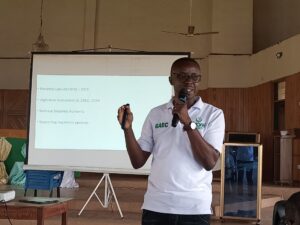GMOs are not harmful to human health, environment – Scientist

Dr Daniel Osei Ofosu, a Research Scientist at the Biotech and Nuclear Agriculture Research Institute, has urged Ghanaians to embrace, and accept Genetically Modified Organism (GMO) foods.
He said GMOs foods were not harmful to human health and environment, explaining that they were technologies for plant breeders that produced crops resilient to varieties of biotic and abiotic stresses.
Some GMOs crops are tolerant to stresses such as salt in the soil, Dr Ofosu stated at a media sensitization workshop on Biotechnology, organized by the Ghana chapter of the Open Forum on Agricultural Biotechnology (OFAB) at Wenchi in the Bono Region.
The workshop aimed at sensitizing the media on agricultural biotechnology and the benefits of the Pod Borer Resistant (PBR) Cowpea seed developed by the Council for Scientific and Industrial Research (CSIR), commercially approved GMOs.
According to Dr Ofosu, the research on PBR cowpea which began in 2013 and released in July 2024, sought to reduce the damage caused by pod borers by 98 percent, noting that its beans yielded fourfold comparatively to non-transgenic varieties.
He noted with concern that previous media coverage on GMOs in the country was unhelpful and expressed the hope that with understanding, the media would help dispel the misconception about the GMOs.
“Seed producers are currently working to multiply these GMOs crops for farmers, with the goal of making them available to consumers by the 2025 growing season”, he stated.
Dr Ofosu explained that cowpeas typically matured in eight weeks, an indication that farmers ought to spray their crops at least eight times to fight insects, however with the PBR cowpeas, farmers only needed to spray twice, saying the pod borer insect could cause up to 80 percent losses.
“So, by applying the GM technology the number of sprayings will reduce and that will subsequently result in increased yields”, Dr Ofosu stated.
He said the new BPR cowpeas had undergone extensive research, hence the need for the media to propagate the news for the public to understand that “GMOs are other tools in agriculture and don’t threaten human health and environment”.
Madam Ama Kudom-Agyemang, a Media Consultant, provided an insight on how the media could churn out compelling stories on biotech by approaching and interviewing scientists as well as cultivating sources in the biotechnology field.
Source: GNA

It’s not a surprise, with inception of corn oil, sunflower so all vegetable oils, our so- called scientists backed the western theories that coconut oil, palm nut oil and palm kernel oil are harmful to our health when they realized Africa was build economy basing on it. Now it’s obvious that it’s not true and most of the people who supported that has come out. So let him make a name for himself but I know it’s a lie.
You don’t know anything abt this GMO foods bro. Germany France and others have rejected it. What are you talking abt? This ignorance is killing more people. Or you took money?
In many cases, scientists may align their findings with the interests of those funding their research, a phenomenon known as “funding bias.” However, if you choose to advocate for organic beings to embrace genetically engineered foods (or synthetics), that responsibility ultimately lies with you. Koo Bibinii
Why should we discard organic for GMO’s!? When you go abroad, organic food is more expensive, why? The answer is simple. It is because it is healthier and much better for the body.
Sad to hear this from a Dr. Shame, we’re aware of the self-destruction we have been subjected to, GMO’s are the worst source of food to Africa. In Russia any farmer that grows GMO crop is considered as a terrorist stop feeding the masses with information which will endanger their lives.